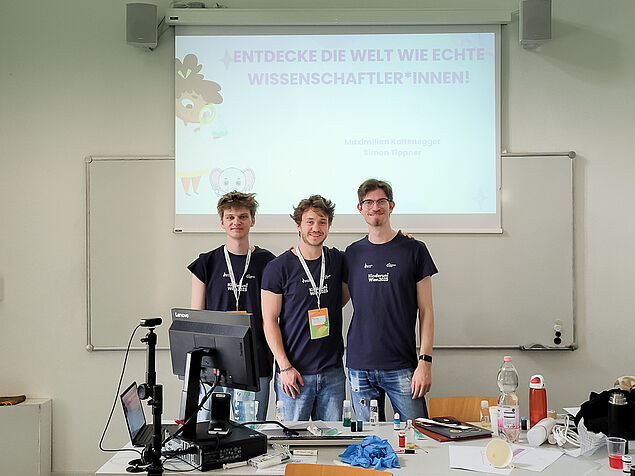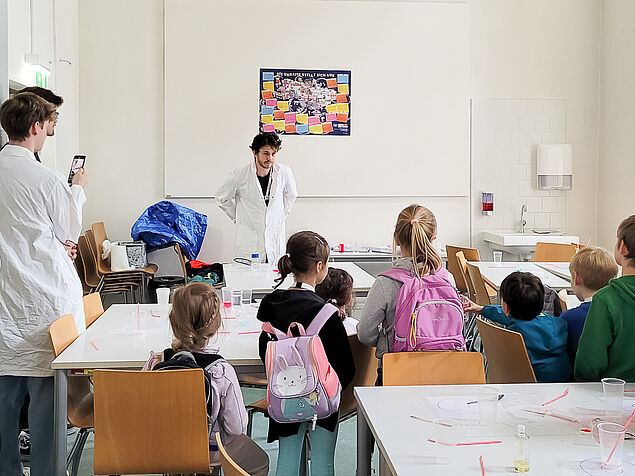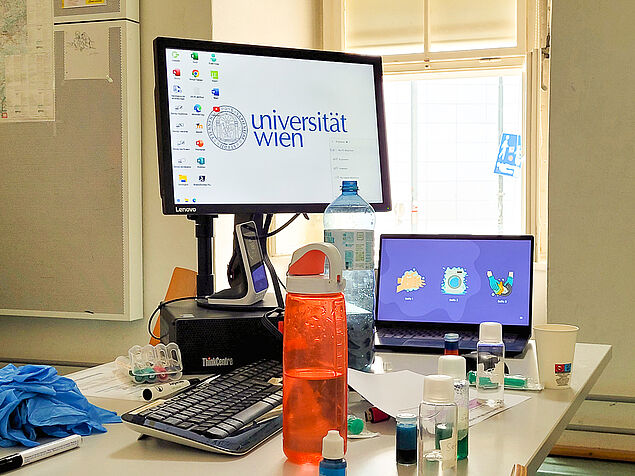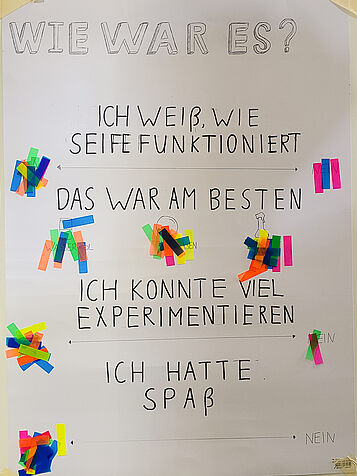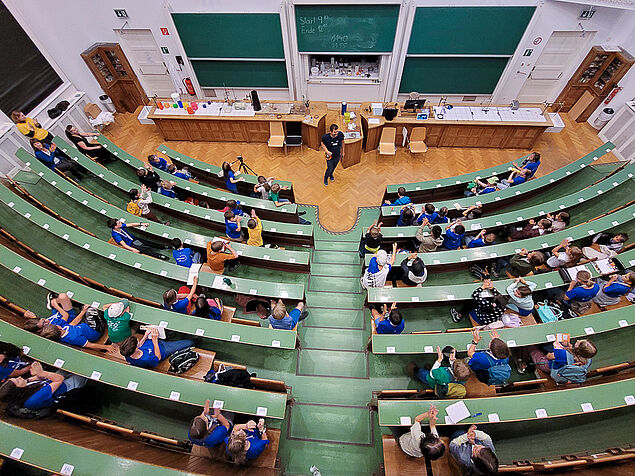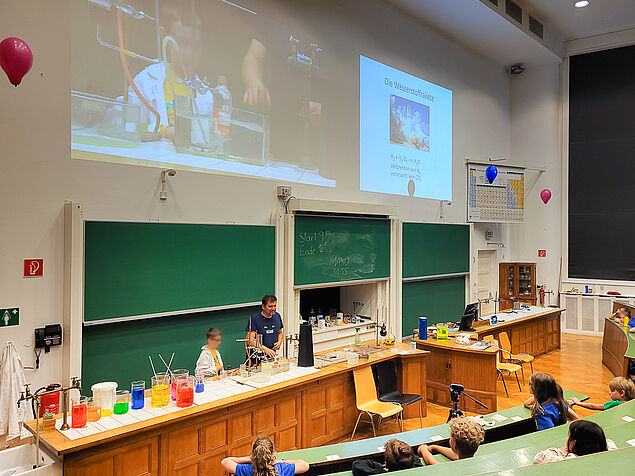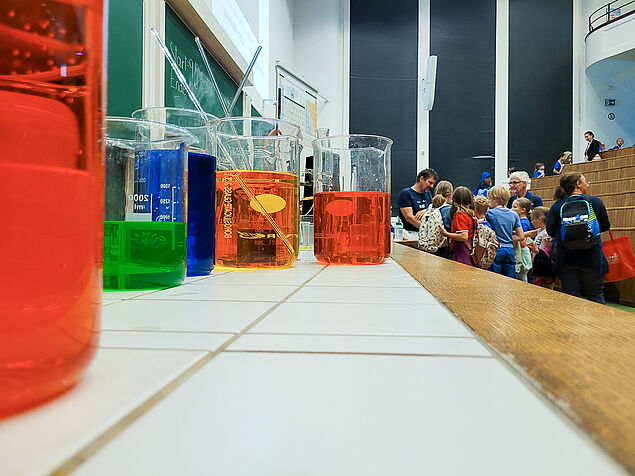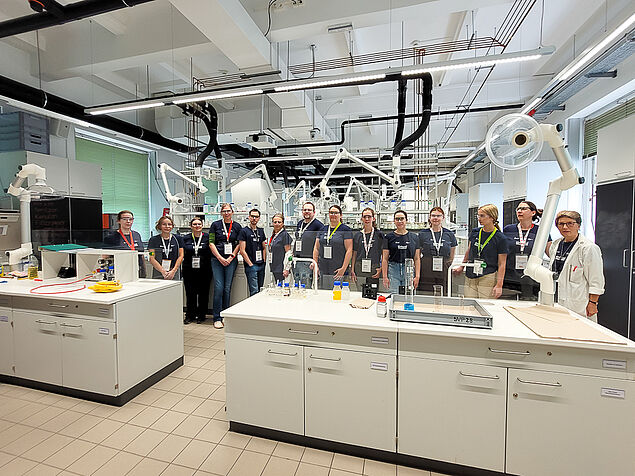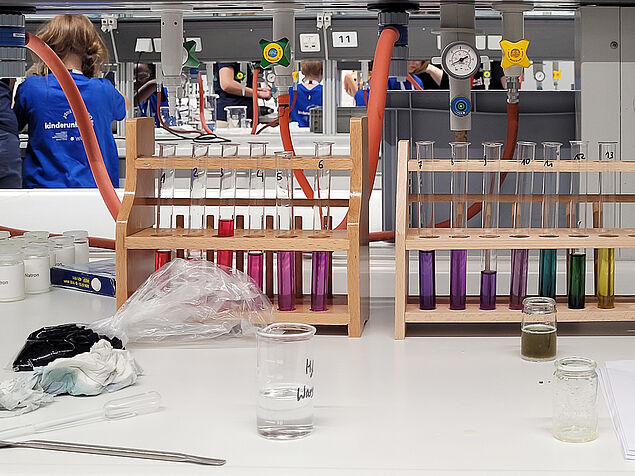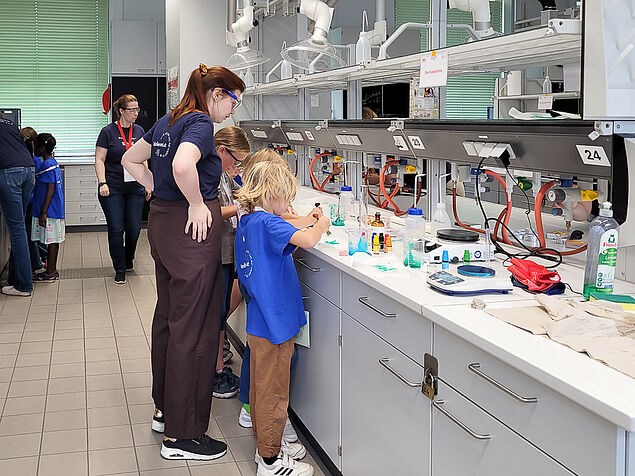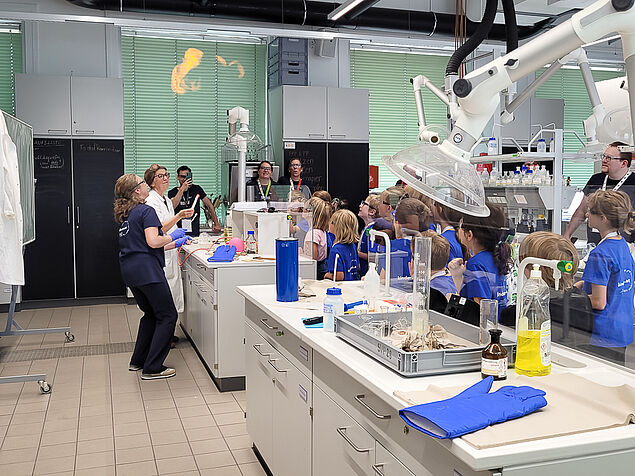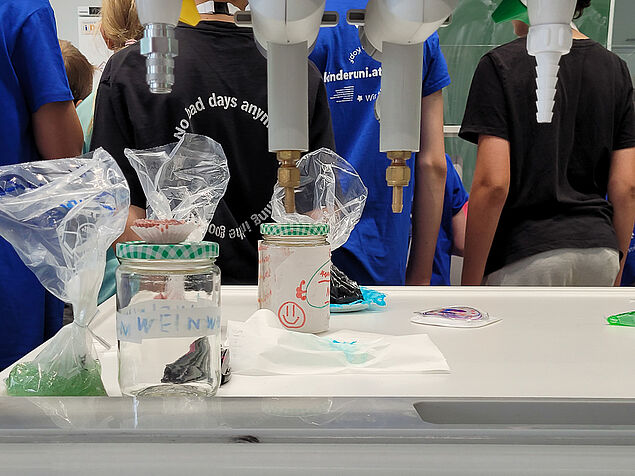Young Researchers Discover Chemistry: Faculty Projects at the Children's University 2025
From workshops and hands-on stations to experimental lectures, the Faculty of Chemistry's projects at the Children's University 2025 demonstrated the diversity of science communication and its ability to inspire young researchers. With creativity and personal commitment, staff members, students, and supporters provided insights into the world of science that left lasting impressions.
Explore the World like Real Scientists!
The Faculty’s first contribution focused on everyday chemistry – presented in a hands-on, age-appropriate format with scientific rigor.
Simon Tippner, a doctoral candidate at the Institute of Theoretical Chemistry, physics student Maximilian Kaltenegger, and primary school teacher education student Jakob Gumprecht, designed a workshop for children aged seven to nine, allowing them to conduct their own experiments. They learned how soap connects oil and water – and what this has to do with the special structure of surfactants. In another experiment, they investigated why large soap bubbles burst more quickly than small ones, why dishwashing detergent is particularly suitable for this purpose, and how reliable conclusions can only be drawn from many individual observations.
A highlight of the workshop was the demonstration of the “elephant toothpaste” experiment: hydrogen peroxide is broken down with the help of a catalyst, and the resulting oxygen creates a spectacular foam reaction.
“We learned a lot ourselves,” the team concluded, “and we would love to come back next time. Conveying complex scientific concepts in simple terms was definitely challenging, but it also improved our own understanding.”
The workshop was developed as part of the seminar Telling your story – Science Communication of Research Projects, initiated by Dr. Christiane Maria Losert-Valiente Kroon at the Faculty of Physics. Since 2023, it has been run in collaboration with Dr Katharina Pallitsch (Institute of Organic Chemistry). The aim is to teach participants how to communicate scientific content in a way that is both understandable and tailored to the target group – a goal the team impressively achieved in their Children’s University debut.
Climate Crisis? We’ll Catch the Carbon!
Ing. Norbert Kandler is a veteran of the Children's University. His demonstration lectures fascinate young participants year after year and inspire some to pursue degree courses. He has even encountered former Children's University attendees years later as students. In his introductory lecture for the Bachelor's programme in Chemistry, he uses experiments to help students grasp fundamental chemical principles, for which he was awarded a teaching prize by the faculty's students in 2023.
This year’s lecture focused entirely on climate change. Through the combustion and controlled explosions of gases like methane and hydrogen, children were able to observe what happens during these reactions, helping them to better understand an otherwise abstract topic. With spectacular effects, Kandler demonstrated how carbon dioxide is created – and how it can be captured again: Chemistry is not magic, but sometimes it feels a bit magical.
As a child, he did not find chemistry class very inspiring, but a friend’s chemistry set sparked his fascination with the subject. Now, he is dedicated to making chemistry exciting and engaging for children and university students alike. He especially values the direct feedback he receives from his audience.
“The way knowledge is conveyed is important,” emphasises Norbert Kandler. “At the Children's University, the story and its effects need to work together so that children of all ages can take something away with them, even if they don't understand everything yet. Understanding what is behind something makes learning more enjoyable.”
The children’s loud enthusiasm – many of them returning participants – proved him right.
Chemistry is fun!
The Institute of Didactics of Chemistry invited children aged seven to nine and ten to twelve to explore the world of chemistry through exciting experiments in a workshop. After a brief safety introduction and equipped with protective goggles, the young researchers got to experiment at ten work stations using everyday materials, learning lots of new things in the process.
Guided by staff and students, the children tested pH indicators, investigated how diapers absorb liquids, and explored how a candle works. They made starch-based glue for crafts, produced slime from psyllium husks, poured silicone moulds, created pendants from used plastic packaging, and made biodegradable films from renewable raw materials like starch. A highlight was launching a “fizzy powder rocket.” With lots of fun crafts and easy-to-understand explanations, the children experienced science first-hand and were able to take their creations home as souvenirs. The event concluded with impressive experiments on gases, presented by the institute's staff.
The Institute, established in 2018 at the Faculty of Chemistry, opened the Vienna Teaching-Learning Lab (WiL2La) in 2024. This facility offers teaching students practical experience in simulated classroom settings: they can plan, conduct, and reflect on their own experiments with school classes in a safe and supportive environment, gaining valuable experience for their future careers. Schoolchildren benefit in turn from engaging, hands-on approach to learning about chemistry. The Children’s University workshop is a compelling example of the institute’s commitment to early science education.
Prof. Elisabeth Hofer, who has heads the institute since 2025, and Dr Monika Neuffer, who oversees the Teaching and Learning Laboratory, conclude: “Once again, it was a great pleasure for us to be part of the Children’s University with our workshop ‘Chemistry is Fun.’ Initiatives like this are incredibly important to spark interest in science at an early age and to show just how much chemistry is part of our everyday lives. Especially in childhood, positive encounters with scientific topics can lay the foundation for long-term enthusiasm.”

